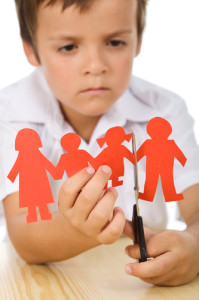{2:54 minutes to read} Children and adults alike whose parents have been divorced seem to carry that label with them along with other labels, such as child from a  broken family or from a broken home, which define them. Whether their parents’ divorce was amicable “enough” or acrimonious, they are still “children of divorce.”
broken family or from a broken home, which define them. Whether their parents’ divorce was amicable “enough” or acrimonious, they are still “children of divorce.”
I recently met with Liz Morrison, LCSW, a therapist who works with children and their parents during these difficult transitions in their lives, and I asked her to enlighten us with her knowledge.
Could you please share with us some of the emotions children feel when their parents are getting separated or divorced?
Children whose parents are getting separated or divorced can experience a wide variety of emotions and feelings. Some common reactions include:
- Sadness;
- Anxiety;
- Confusion;
- Anger;
- Avoidance; and
- Guilt.
Depending on their developmental stage, children can transition these feelings into worrisome behaviors. These behaviors include but are not limited to:
- Having school difficulties;
- Exhibiting behavioral problems;
- Experiencing a decrease in self-esteem;
- Becoming isolated;
- Withdrawing from activities; or
- Engaging in high-risk behaviors.
How can parents support their children during these times?
There are many things that parents can do to help their child through a separation or a divorce.
- Take some time to listen to what your child is feeling.
Children of divorce can feel out of control and that their feelings do not matter. Having a daily or weekly check-in time with your child can help a child regain some of that control and feel more connected to his parents.
- Reassure your child often that the divorce is not their fault.
Children who blame themselves for a divorce or separation are more likely to shut down and experience symptoms of depression. Making sure that the child knows the breakup is exclusively due to adult issues can go a long way in helping and supporting a child.
- Provide your child with coping skills to use when they are having specific feelings.
Some of those coping skills can include: going to a safe space in the house to take a break, learning and implementing deep breathing exercises, or keeping a journal to write down feelings. Teaching your child healthy ways to cope can be an important step in reducing the risk for acting out behaviors.
Liz Morrison received a Masters in Social Work from Columbia University and a Certificate in Children and Family Therapy from New York University. She has a private practice in Manhattan. She can be reached at (347) 758-2985 or through her website at www.LizMorrisonTherapy.com
Jennifer Safian
divorce and family mediation
upper east side of manhattan (nyc)
new york, ny
(917) 881 5206
jpsafian@gmail.com
Latest posts by Jennifer Safian (see all)
- misinterpreting your partner’s demeanor may lead to conflict - October 9, 2024
- demystifying the money talk - September 11, 2024
- why are we afraid to discuss money? - August 21, 2024





Leave A Comment